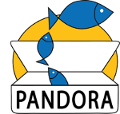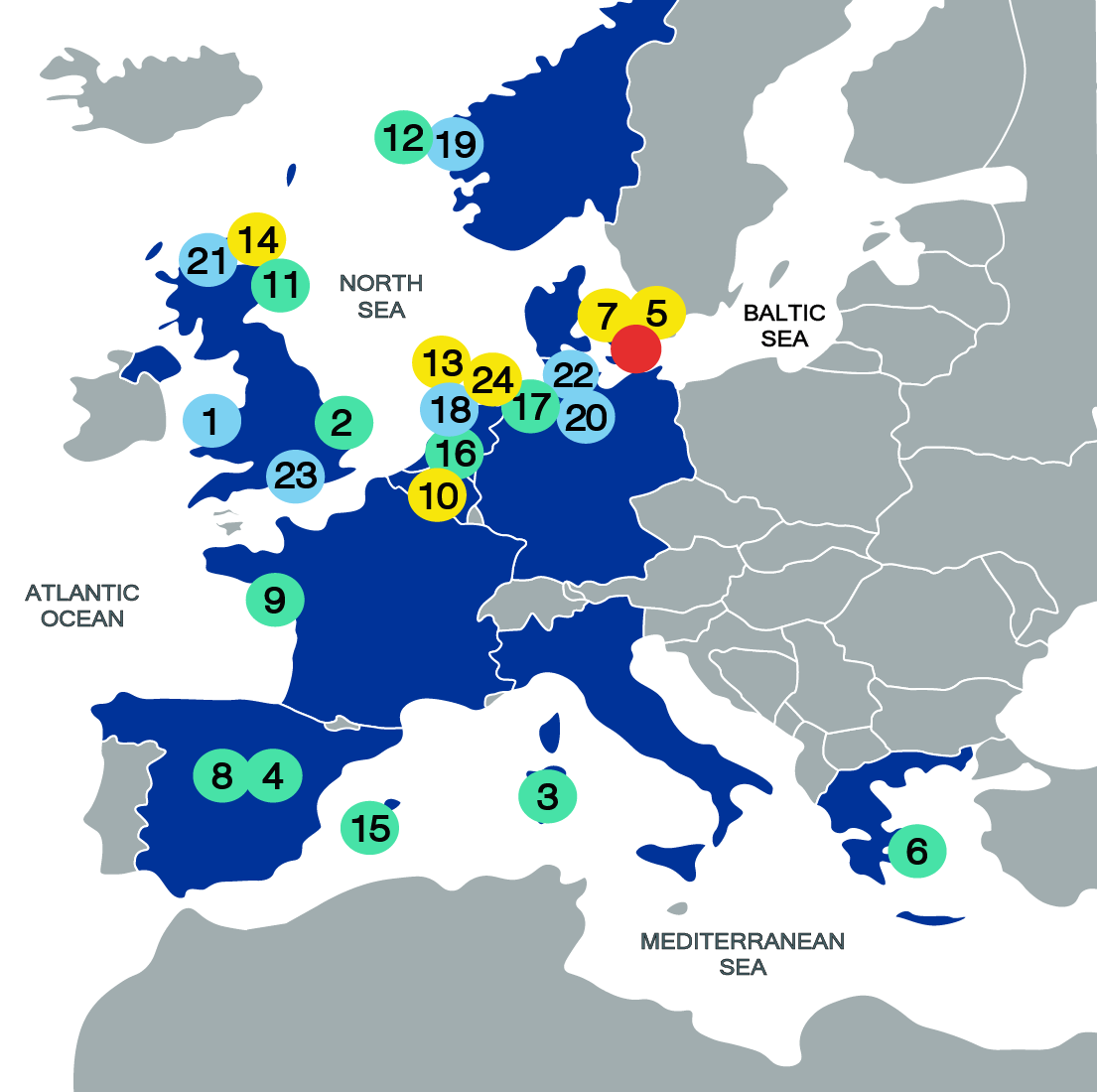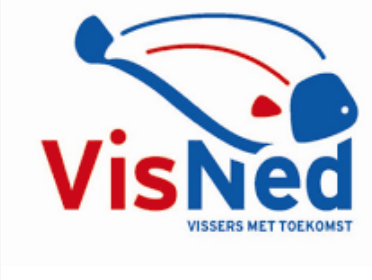Who we are
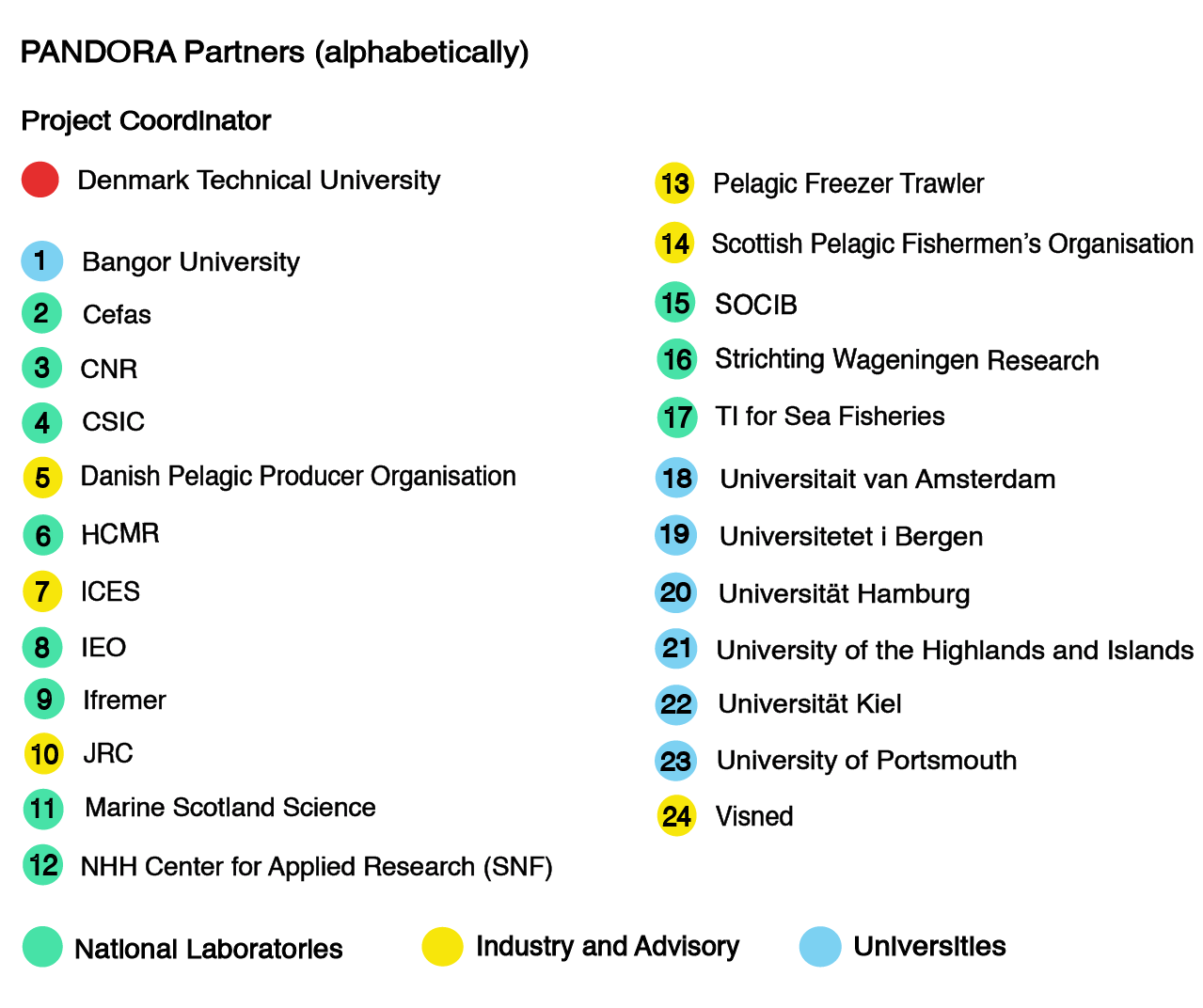
PANDORA is a cooperation of 25 project partners from across Europe, covering all marine waters of the EU and Norway.
Our consortium consists of
8 universtities
11 national marine laboratories
and 6 partners from industry and advisory bodies.
Thus, PANDORA brings together the a range of experts and actors across different disciplines and institutions. This diversity of partners guarantees that PANDORA will not only harness biological and ecological knowledge to improve fisheries assessments, but also to implement these new tools to provide the best possible science-based advice on enhancing the sustainable Blue Growth of European fisheries.
For detailed information about the PANDORA project partners, please click below. The partners are sorted by category and, within each category, alphabetically with their respective number from the map above.
Universities
 National Institute of Aquatic Resources, Technical University of Denmark (DTU Aqua) (Coordinator)
National Institute of Aquatic Resources, Technical University of Denmark (DTU Aqua) (Coordinator)
Technical University of Denmark is a self-governed university that operates at a high internationallevel in a wide array of research areas within science and technology. DTU Aqua provides research, education and advice concerning sustainable exploitation of living marine and fresh water resources. DTU Aqua conducts research in the interactions between the aquatic environment, productivity and variation in fish stocks, methods for fish stock assessment, development of methods for sustainable fisheries management and stock enhancement. The institute also conducts the Danish national monitoring on fish and fisheries for the EU. DTU Aqua has extensive experience in coordinating and managing scientific projects, including the coordination of EU framework projects.
Contribution to PANDORA: DTU Aqua is the Project coordinator and will lead WP1 (Existing and new biological knowledge) and WP6 (project management) within PANDORA. Moreover, DTU leads task 2.1 on modifying assessment and projection models. DTU Aqua will contribute to all WPs and its work will focus onthe generation of biological knowledge and its integration in ecosystem-based fisheries management.
Contact: Dr. Stefan Neuenfeldt, PANDORA Coordinator
1. Bangor University (BU)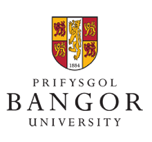
Bangor University has a long tradition of academic excellence, and in the 2014 UK Research Excellence Framework (REF) more than 75% of Bangor’s research was world-leading or internationally excellent. Research in the School of Biological Sciences was ranked in the top 20 in the UK, and supports a vigorous research base, including molecular ecology and fisheries genetics. The School receives substantial financial support from major UK and international funders, including the European Commission. The Molecular Ecology and Fisheries Genetics Laboratory (MEFGL) is a European leader in management of aquatic natural resources. Particular emphasis is on the application of molecular markers and ecological theory to explore the conservation of genetic resources in relation to environmental change, domestication and exploitation. MEFGL focuses particularly on tool development for integration with fisheries science, including environmental DNA, SNP markers and genome sequencing, including traceability, assignment, distribution and abundance of populations, risk assessment in aquaculture, fish microbiomes, stock structure and marine ecosystem structure and diversity.
Contribution to PANDORA: Bangor will contribute to WPs 1 (Existing and new biological knowledge), 2 (Resource assessment and projection), 4 (Management options), 5 (Engagement, communication & impact) and focus on new data for stock structure.
Contact: Prof. Gary Carvalho, School of Biological Sciences
18. University of Amsterdam, Institute for Biodiversity and Ecosystem Dynamics (UA) 
The UA ranks amongst the largest comprehensive universities in Europe and is one of the leading research universities in the world, ranking 77th in the 2014-15 World University Ranking by Times Higher Education (THE), and 55th in the 2015 QS World University Rankings. The UA has been involved in over 200 FP7 projects, of which it coordinated 40. In the current H2020 program, 50 projects with UA involvement have been awarded (some are in grant preparation), of which the UA coordinates about 50%. The Institute for Biodiversity and Ecosystem Dynamics (IBED) is one of the eight research institutes of the Faculty of Science at the University of Amsterdam. The research at IBED aims to unravel how ecosystems function in all their complexity, and how they change due to natural processes and human activities. At its core lies an integrated systems approach, encompassing both experimental and theoretical methodologies at a wide variety of temporal and spatial scales, to study biodiversity, ecosystems and the environment. IBED adopts this systems approach to ecosystems, addressing abiotic (soil and water quality) and biotic factors (presence, population dynamics and functioning of plants, animals, microbes), and the interplay between these ecosystem components.
Contribution to PANDORA: UA will contribute to WPs 1 (Existing and new biological knowledge), 2 (Resource assessment and projection), 4 (Management options), 5 (Engagement, communication & impact) with its main contribution being in task 1.3 on the Generation of new causal data and knowledge. Its work will mainly take a theoretical fisheries ecology approach, using physiologically structured population dynamics for modeling system dynamics.
Contact: Prof. Dr. André de Roos, Institute for Biodiversity and Ecosystem Dynamics
19. University of Bergen, Department of Biology (UoB) 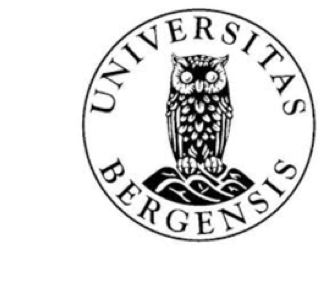
The University of Bergen has about 14,500 students and 3,200 staff, making it a medium sized European University. Six faculties cover most of the traditional university disciplines. Within the faculties are 60 different specialized departments, multi-disciplinary research centers and institutes. The Department of Biology (BIO), which is involved in this project, is one of the largest research units within marine biology in Norway. BIO has strong research groups in fisheries science, aquaculture, marine ecosystems and microbiology, all of which are relevant to the work undertaken in PANDORA. In particular, BIO has extensive experience in developing numerical models of marine organisms, ecosystems and harvesting strategies. Additionally, BIO hosts a Center of Excellence in Biology Education (bioCEED), which has been awarded by the the Norwegian Agency for Quality Assurance in Education. UoB is engaged in the European Union's Framework Programmes and has been designated as a European Research Infrastructure and a Research Training Site in several scientific fields. Since 1997, more than 500 European researchers have visited Bergen on EU grants, which is well in line with UoB’s ambition of attracting both senior and junior scientists to contribute to research teams and work in multidisciplinary research groups. UoB is involved in 109 FP7 projects - 38 coordinated by UoB, among them UoB hosts 7 ERC Advanced Grants, 1 ERC Starting Grant and 1 ERC Synergy Grant. To date (2017-07-01), UoB has been awarded 65 projects under H2020 of which 20 are coordinated by UoB – including 2 ERC Starting Grants, 3 ERC Consolidator Grants and 2 ERC Advanced Grants. In addition, UoB also hosts 3 National Centers of Excellence awarded by the Research Council of Norway. In 2014, the Research Council of Norway awarded funds to UoB for the development of infrastructures that include Health Registries for Research, Remotely Operated Vehicles for Deep Marine Research, Earth Surface Sediment Laboratory and the Norwegian Nuclear Magnetic Resonance Platform.
Contribution to PANDORA: UoB will contribute to WP1 (Existing and new biological knowledge) and will lead task 1.2 on creating process knowledge from existing data. UoB will provide expertise on ecological and evolutionary theory and take part in the model developments.
Contact: Prof. Øyvind Fiksen, Department of Biological Sciences
20. University of Hamburg (UHAM) 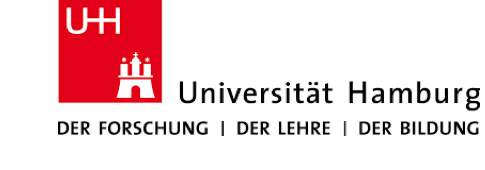
With about 38,000 students, the University of Hamburg is one of Germany’s largest universities. Researchers working within PANDORA are part of two institutes within The Center for Earth System Research and Sustainability (CEN), an inter-disciplinary group of researchers from the natural sciences, economics and humanities working together to project how climate change and other anthropogenic pressures will impact the earth’s ecosystems and their goods and services including marine capture fisheries. The Institute of Hydrobiology and Fisheries Science (IHF) performs process-oriented laboratory, field and modelling studies to better understand and predict the dynamic interactions within aquatic food webs and between organisms and their physical environment such as bottom-up and top-down processes impacting living marine resources in shelf/enclosed seas (Baltic Sea, North Sea). A main goal of IHF is to advance the predictive capacity of models applied within integrated, ecosystem-based management. The Centre for Globalisation and Governance has five research areas including institutional change and understanding how governance mechanisms shape the economic behaviour of consumers and households, corporate actors, national policies, and international regimes.
Contribution to PANDORA: UHAM will lead WP5 (Engagement, communication & impact) and contribute to WP1 (Existing and new biological knowledge) and WP2 (Resource assessment and projection). UHAM’s work will focus on the extensive communication and stakeholder engagement activities foreseen in PANDORA, and further development of the North Sea Atlantis model and its integration in the ecosystem-based fisheries management process.
Contact: Prof. Myron Peck, Institute for Marine Ecosystem and Fisheries Science
21. University of the Highlands and Islands (UHI) 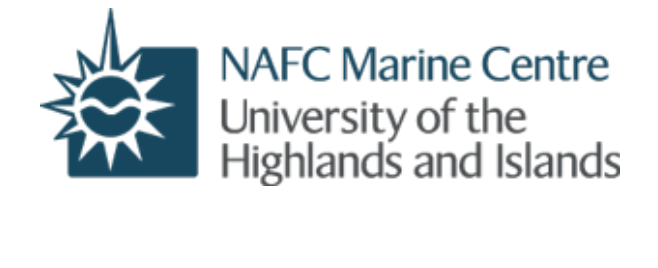
The University of the Highlands and Islands is an amalgamation of 13 research and teaching institutions located throughout the north and west of Scotland and the Scottish Islands. This model gives the University a large geographical coverage and supports small but high quality research establishments located in peripheral areas, mostly remote coastal communities. The University therefore has an ideal local environment for marine research, for which it has built an outstanding reputation; 65% of research was graded 3* (internationally excellent) or 4*(world leading) in the latest (2014) UK Research Excellence Framework (REF) exercise. The university teaches over 7800 higher education students. The NAFC Marine Centre (part of the Faculty of Science, Health and Engineering) is an educational and scientific institute, located in Shetland. The Centre provides a range of services relevant to the maritime industries, including: training and education; research and development; and consultancy and advisory services. The Centre has built a strong reputation in applied fisheries research, industry partnership working and stakeholder engagement. For example, the Centre’s ongoing program of shellfish research, data collection, stock assessments and close working with local management have supported Shetland shellfish fisheries to attain MSC accreditation. In recent years and in response to industry need, the Centre has undertaken a series of collaborative data collection and research projects focusing on data limited stocks which are of local significance.
Contribution to PANDORA: UHI will contribute to WP1 (Existing and new biological knowledge) and WP5 (Engagement, communication & impact). UHI will primarily focus on the co-development of a pilot stakeholder sampling and training programme for the pelagic mackerel fishery centred around Shetland.
Contact: Dr. Chevonne Angus, Joint Head of Marine Science and Technology
22. University of Kiel, Department of Economics (CAU) 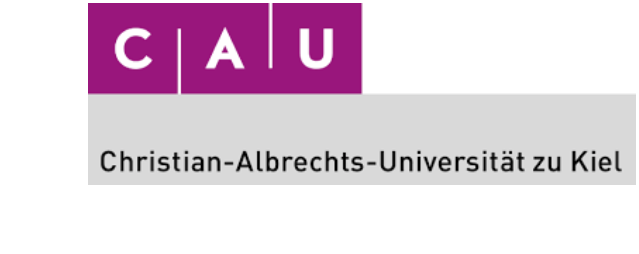
Christian-Albrechts-Universität zu Kiel (CAU) holds >1.150 scientific staff involved in both teaching and research.
In research, CAU is well-profiled; e.g. it currently holds 3 projects funded by the German “Excellence Initiative” and is currently involved in > 30 projects under EU’s Horizon 2020 and 7th Framework Programme. The Department of Economics, which takes part in PANDORA, has a long tradition in the field of resource economics. Several major research projects have been coordinated on this theme. In particular, the Department hosts two research groups within the ‘Cluster of excellence’ Future Ocean, which is funded by the German Federal Government. One of these research groups is dealing with questions of sustainable fisheries management. This group consists of leading scientists in the field of resource economics, population dynamics of exploited fish stocks, and marine ecology.
Contribution to PANDORA: CAU will be involved in WPs 1 (Existing and new biological knowledge), 2 (Resource assessment and projection), 3 (Economic projections), 4 (Management options), 5 (Engagement, communication & impact) and will co-lead task 5.1 (Co-create PANDOAR with EU fisheries stakeholders). CAU’s work will focus onintegrated ecological-economic fisheries assessment and management in the Baltic Sea.
Contact: Dr. Rudi Voss, Enrivonmental, Resource and Ecological Economics Research Group
23. University of Portsmouth (UoP)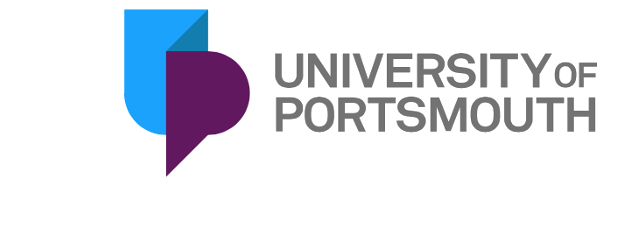
The University of Portsmouth Higher Education Corporation (UoP) is an experienced research and training provider that is ranked in the top 2% of the world's universities in the Times Higher Education World University Rankings 2015, and is one of the world's top 150 universities. The most recent UK Research Excellence Framework exercise rated over 60% of UoP research as world-leading and internationally excellent. UoP has been awarded both the European Commission Human Resources Excellence in Research Award as well as the Athena Swan Bronze Award; demonstrating UoP’s commitment to good working conditions, career development for all researchers and gender equality. The Business School (PBS) of the University has a long history in economics and management of marine resources with the former Research Centre CEMARE and the current Blue Governance Research Group. PBS is currently involved in the FARFISH project related to the management of fisheries targeted by the EU distant water fleet in African countries waters.
Contribution to the project: UoP will lead WP4 (Management options) and will contribute to WP3 (Economic projections) and WP5 (Engagement, communication & impact). WP4 will be carried out in collaboration with relevant organisations and stakeholders in the countries of case studies, including Local Fisheries Management Organisations, RFMOs, the scientific community and Fish Producer Organisations. UoP will set-up a two-way communication with stakeholders (in conjunction with WP5 and in collaboration with Project partners in charge of Regions), through regular email exchanges and a series of 3 workshops will assist the project in developing the best management options to arrive at optimal management solutions. While UoP will overall lead WP4, the three sub-work packages will be coordinated by DPPO, HCMR and TI.
UoP will contribute to the development of Scenarios that will be elaborated on the base of stakeholders-scientists’ common definition of management questions and scenario drafts using key findings of WP2 and WP3 (as well as outcomes of previous EU projects such as PECHDEV, POORFISH, SOCIOEC, etc.). Since these scenarios will be developed in parallel with WP2 and WP3 they will be progressively fine-tuned, integrating in a real-time basis the new ideas emerging from the biological and economic work. Furthermore, UoP will introduce the concept of the societal cost (e.g. ecological, economic, social including issues relating to markets and food security) to the conception of the scenarios. This concept has been previously defined and used in the former EU ECOST project, along with other concepts such as Pretty Good Yield, Environmental externalities, and other insights offered by the RFMOs.
Contact: Dr. Pierre Failler, Department of Economics and Finance
National Laboratories
2. Centre for Environment, Fisheries and Aquaculture Science (Cefas)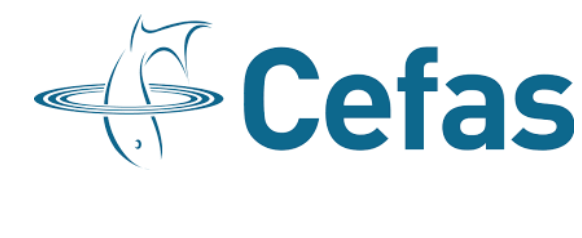
Cefas is a multidisciplinary scientific research and consultancy centre delivering solutions to meet the diverse needs of public and private sector businesses and organisations active in marine, coastal, estuarine and freshwater environments. We provide a comprehensive portfolio of research, consultancy and training services in environmental monitoring and assessment, fisheries science and management, fish and shellfish health, hygiene and cultivation, to clients around the world and maintain extensive collaborative links with research institutes, technical development companies and universities on a global basis.
Contribution to PANDORA: Cefas is a major partner within the PANDORA project and is involved in the following tasks:
• Work package 1: Collating existing and new biological knowledge on fish stock structure and life-history
• Work package 2: Resource assessment and potential, including multispecies MSY and “pretty good yield” (PGY) approaches
• Work package 4: Scoping and recommending fisheries management options
• Work package 5: Stakeholder engagement, communication and impact
Cefas will be working with institutes and stakeholders across the EU to ensure that the project considers the knowledge and perspectives of the UK, whilst enabling us to keep abreast of new developments so that we maintain parity of capability with potential international rivals. Because the project involves most of the key fisheries institutes in Europe and proposes to provide operational tools for use in ICES management advice, it is important that the UK fully participates in the shaping of this important agenda.
Contact: Dr. Robert Thorpe, Principal Scientist, Marine Fisheries
3. Italian National Research Council (IAMC-CNR)
The Italian National Research Council (CNR) is a public organization; its duty is to carry out and promote research activities and to improve their applications for the scientific, technological, economic and social development of Italy. The CNR has over 8000 employees of which over 4200 are researchers. The IAMC-CNR (Institute for Coastal and Marine Environment) carries out research on marine and coastal ecology, focusing on ecosystem modelling and oceanography, sediment dynamics, coastal erosion, benthic ecology, fish ecology and energetics. The IAMC-CNR investigates the effect of natural and anthropogenic-induced changes on the functioning of coastal ecosystems. IAMC-CNR has had a leading role in many EU projects as a coordinator and as participant.
Contribution to PANDORA: IAMC-CNR will be involved in WPs 1 (Existing and new biological knowledge), 2 (Resource assessment and projection), 3 (Economic projections), 4 (Management options), 5 (Engagement, communication & impact) and is task leader of 1.3. IAMC-CNR will focus on the generation of biological knowledge and modeling the combined effect of multiple stressors on the marine ecosystem, including its effect on the society.
Contact: Paolo Domenici, Research Manager / Ecophysiology
4. Spanish National Research Council (CSIC) 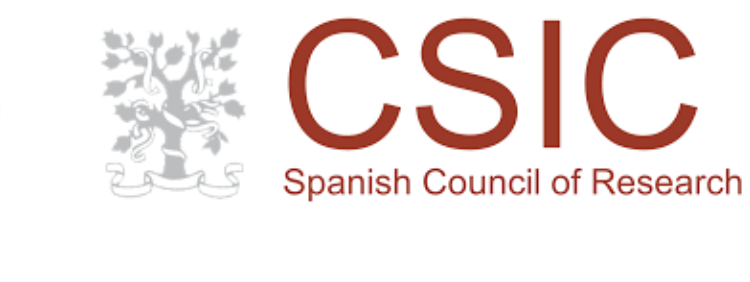
The Spanish National Research Council, CSIC, is the main research institution in Spain. It carries out scientific and technical research, knowledge transfer and training of post-graduate students. The Marine Science Institute (ICM) will execute the contribution of CSIC to PANDORA. CSIC-ICM is a multidisciplinary marine research laboratory which covers the fields of marine physics, marine geology, marine biology and fisheries. The CSIC-ICM team has contributed with more than 200 scientific papers to areas related to the project’s objectives in peer-reviewed journals.
Contribution to PANDORA: CSIC will contribute to all WPs will coordinate Task 3.2. Its work will focus on the generation of biological knowledge, economic analysis and their integration in ecosystem-based fisheries management. The specific objectives of the team are to examine by means of bioeconomic modelling the fisheries performance, economic efficiency, technological progress, and the effect of subsidies on Mediterranean fisheries. The work will revolve around the case study “NW Mediterranean demersal fisheries”, which face endogenous socio-economic problems (low productivity; lack of skilled labour) and exogenous impacts (other economic activities competing for space; fuel price; climatic change).
The research team will seek the collaboration of the local fishing industry, fisheries managers and other stakeholders to produce creative solutions aiming to promote fisheries sustainability in the NW Mediterranean, including alternative management strategies, valorization of bycatch products and minimize concurrence from other seafood sources (imports, aquaculture).
Contact: Francesc Maynou, Institute of Marine Sciences
6. Hellenic Centre for Marine Research (HCMR) 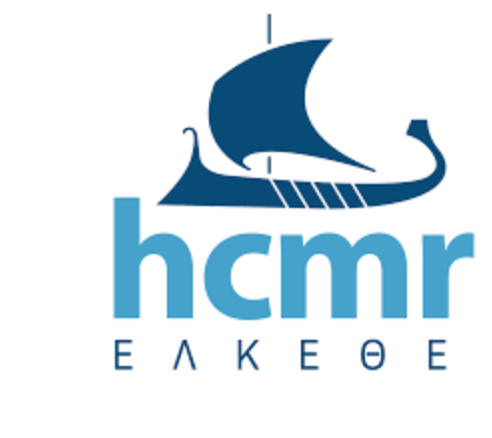
The Hellenic Centre for Marine Research (HCMR) is the largest governmental research organization in Greece consisting of three institutes. HCMR carries out scientific and technological research, experimental development, dissemination and implementation of results focusing on the protection of the hydrosphere, its organisms, its interface with the atmosphere, the coast and the sea bottom and the physical, chemical, biological and geological conditions that prevail and regulate the above mentioned systems. HCMR will participate in PANDORA with the Institute of Marine Biological Resources and Inland Waters (IMBRIW). IMBRIW pursues science-based conservation and management of aquatic ecosystems; it provides scientific guidance to decision makers and supports public awareness and education for conserving marine and inland water environments. Its mission is accomplished through: (a) carrying out multidisciplinary and integrated field, laboratory and experimental research; (b) monitoring, scientific assessments and predictions of the status of fish and shellfish stocks; (c) ecological quality assessments and monitoring of inland waters; (d) providing advice for the sustainable exploitation of fisheries resources; (e) developing new tools and designing management plans for national and international bodies.
Contribution to PANDORA: HCMR will be involved in WPs 1 (Existing and new biological knowledge), 2 (Resource assessment and projection), 3 (Economic projections), 4 (Management options), 5 (Engagement, communication & impact) focusing on the generation of biological knowledge regarding Aegean Sea demersal species and its integration in ecosystem-based fisheries management under climate change scenarios. Moreover, being responsible for “Task 4.2- Scenario development” HCMR, with the contribution of all partners, will develop a set of scenarios so that to achieve a trade-off between stakeholder requirements and the bio-economic context helping to identify the path of least resistance between sustainable stock management and fleet sustainability.
Contact: Dr. Dimitrios Damalas, Institute of Marine Biological Resources and Inland Waters
8. Instituto Español de Oceanografía (IEO)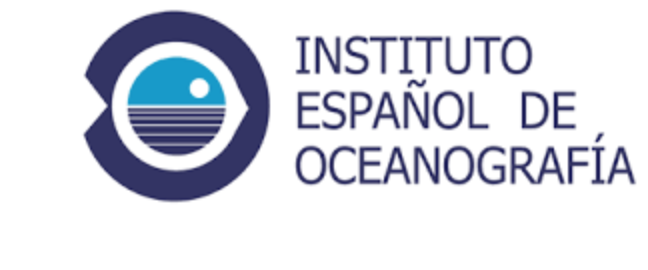
The main roles of IEO (http://www.ieo.es/) are to conduct marine research and give advice to the Spanish government on the exploitation, conservation and management of marine ecosystems. One of its main tasks is to assess fish stocks of interest to the Spanish fishing fleet, as well as the impact of fisheries on the ecosystems. IEO has considerable experience participating in European framework projects related to assessment and management of fisheries. IEO participates in this proposal through its research group working with species exploited by the Mediterranean fisheries and with large migratory species that reproduce in the Mediterranean. The migratory species are also of interest to – and exploited by - international fleets. Particularly for these species IEO participates in assessments conducted by ICCAT and GFCM.
Contribution to PANDORA: IEO will contribute to WPs 1 (Existing and new biological knowledge), 2 (Resource assessment and projection), 3 (Economic projections), 4 (Management options), 5 (Engagement, communication & impact) and will lead task 2.3. IEO’s work includes the full range of activities from scientific surveys and advanced data analyses to stock assessment and participation in expert groups.
Contact: Patricia Reglero, Centre Oceanogràfic de les Balears
9. Institut Français pour l’Exploitation de la Mer (Ifremer)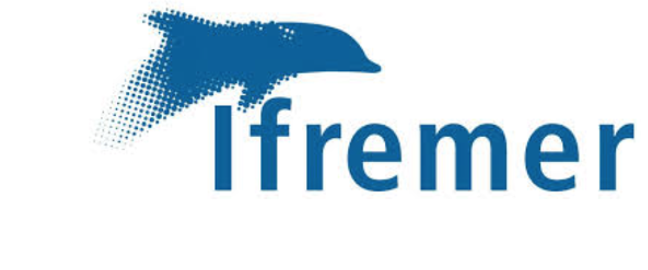
Ifremer is a French public research institute created in 1984 dedicated to research on living and non-living marine resources and ecosystems, technological developments, monitoring and advice. It contributes to national obligations for fish stock and ecosystem surveying and provides advice for fisheries management. Ifremer has participated in many fisheries related research projects and has experience in project and work package management of EU projects.
Contribution to PANDORA: Ifremer is leader of WP2 (Resource assessment and projection) and the Bay of Biscay case study. It will contribute to WPs 1 (Existing and new biological knowledge), 3 (Economic projections), 4 (Management options), 5 (Engagement, communication & impact). In the latter WP, Ifremer will co-lead task 5.1 on co-creating PANDORA with EU fisheries stakeholders, and co-lead task 5.2 on data management and harmonization. In Pandora Ifremer will focus on the generation of biological knowledge for blackspot seabream and several rays species in the Bay of Biscay and the integration of this new information into fisheries management models. A key contribution is the trial of an acoustic survey for blackspot seabream which could be carried out on a fishing vessel.
Contact: Verena Trenkel, Unit of Fisheries Ecology and Modelling
11. Marine Scotland Science (MSS) 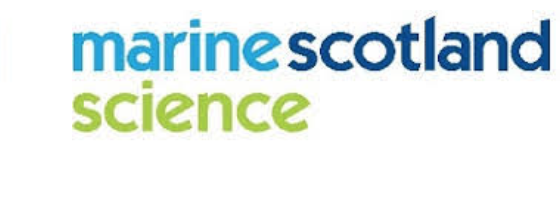
Marine Scotland Science (MSS) is the multi-disciplinary, science-based Division of Marine Scotland, part of the Scottish Government, which is responsible for marine and fisheries issues in Scotland. The MSS Marine Laboratory in Aberdeen houses staff dealing with sea fisheries data collection, analysis and assessment, ecosystem monitoring, renewable energy, compliance, aquaculture, and marine planning. Collectively these provide expert scientific, economic and technical advice and services on marine and freshwater fisheries, aquaculture, and the aquatic environment and its flora and fauna to the Scottish Government and other end users. MSS is a partner in the Marine Alliance for Science and Technology for Scotland (MASTS), has close links with UK universities and operates within the wider international fisheries community working with the International Council for the Exploration of the Sea (ICES), the OSPAR Commission, and the International Maritime Organisation (IMO), among others. MSS provides the data required for the EU Data Collection Framework (DCF) for Scotland. The MSS team contributing to PANDORA, are based in the Marine Laboratory Aberdeen, which has all the necessary infrastructure and facilities needed for their contribution to the project. The MSS team has created a considerable suite of bespoke R functions, code and software for the manipulation, analysis and estimation of fisheries data within common data exchange formats, and which will provide the basis for data analysis in this project.
Contribution to PANDORA: MSS will contribute to WPs 1 (Existing and new biological knowledge), 2 (Resource assessment and projection) and 5 WPs 1 (Existing and new biological knowledge), 2 (Resource assessment and projection). MSS will be the statistical and sampling advisors to task 1.3, and related tasks 2.1, 2.2, 5.1, 5.2, 5.3. MSS input will focus onthe survey design and calculation of biological estimates from industry self-sampling and the training required for such sampling to take place.
Contact: Liz Clarke, Manager of the MSS DCF fisheries sampling programme
12. Norwegian School of Economics, Center for Applied Research (NHH-SNF)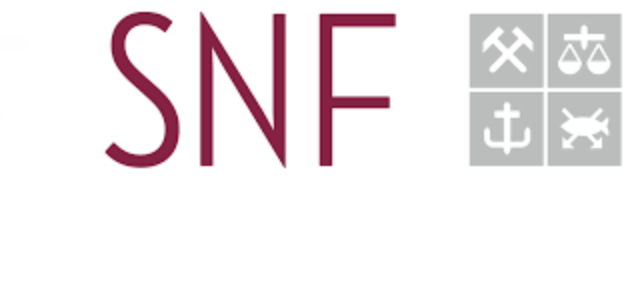
SNF Centre for applied research at NHH (Norwegian School of Economics) is one of Norway's leading research institutes in applied economics. Research on fisheries economics has a more than 60 year tradition and the Centre is one of the leading in the field worldwide. Research issues have varied over time, but the core question has always been how to improve the economic conditions in the fisheries and aquaculture sectors on a sustainable basis. Recently, issues related to climate change and the effects of global warming in relation to fisheries management have been prominent. Other topics include incentive-based management; regulations of aquaculture, capacity adaptation, fleet structure and catch distribution, analysis of supply and demand of fish and fish productsand environmental impacts of fishing and aquaculture. In recent years, SNF has coordinated several projects funded by the Research Council of Norway of direct relevance for this proposal (cf. the list of projects below).
Contribution to PANDORA: SNF will lead WP3 and will contribute to WPs 1 (Existing and new biological knowledge), 2 (Resource assessment and projection), 4 (Management options), 5 (Engagement, communication & impact). Together with the other WP leads, SNF will co-lead task 5.2 on data management and harmonization. SNF’s work will focus on the integration of economics and fisheries science and management.
Contact: Prof. Trond Bjørndal, Natural Resource Economics
15. Balearic Islands Coastal Observing and Forecasting System (SOCIB) 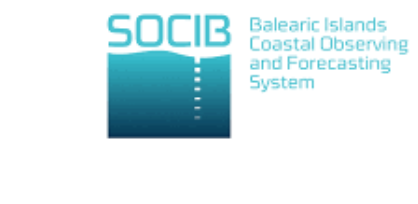
SOCIB, the Balearic Islands Coastal Ocean Observing and Forecasting System, is a multi-platform infrastructure designed to respond to science, technology and society. It is funded by the Spanish Ministry of Economy and Competitiveness (MINECO) and the Balearic Islands Government and is included in Spain’s Large Scale Infrastructures Programme. SOCIB provides streams of oceanographic data and modelling services from coastal to open sea areas to support operational oceanography. Data collection and dissemination are designed to cover the needs of a wide range of scientific research and societal priorities, among which fisheries is a focus topic. Application of operational oceanography to improve assessment and management of exploited species is a main objective for SOCIB.
Contribution to PANDORA: SOCIB will contribute to WPs 1 (Existing and new biological knowledge), 2 (Resource assessment and projection), 4 (Management options), 5 (Engagement, communication & impact). SOCIB will contribute to the activities directed to the implementation of operational oceanography in to the assessment and management processes of tuna species in the Mediterranean.
Contact: Dr. Joaquin Subirana, Professor of Physical Oceanography
16. Wageningen Marine Research (Stichting Wageningen Research) (WR) 
The Wageningen Research foundation (WR foundation) is the legal entity containing a set of institutes that are part of Wageningen University and Research Centre. The WR foundation conducts application-oriented and applied research commissioned by governments, businesses and non-profit organizations. The WR foundation is represented within this proposal by 1 of its member institutes, namely Wageningen Marine Research. Wageningen Marine Research is a leading institute which provides independent research and advice to facilitate integrated sustainable protection, exploitation and use of seas and coastal zones worldwide, but with particular focus on Northwestern European waters. Its products and services are field research, experiments on a real-life scale, exploratory studies on a laboratory scale, data management and modelling. Furthermore, Wageningen Marine Research is a key, proactive player in national and international marine networks (including ICES and EFARO).
Contribution to PANDORA: WR will participate in WPs 1 (Existing and new biological knowledge), 2 (Resource assessment and projection), 4 (Management options), 5 (Engagement, communication & impact). Using population models, WR will develop an understanding of the management consequences of density-dependent reductions in individual growth, which are currently observed in a number of recovering and recovered fish stocks. WR will also interact with the relevant stakeholders to ensure that this knowledge is taken up in the advice and assessment process for the relevant species.
Contact: Dr. Tobias van Kooten, Senior Scientist
17. Thünen Institute for Sea Fisheries (TI) 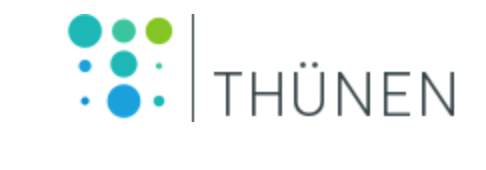
TI prepares decision support for the German Federal Ministry of Food and Agriculture (BMEL) with respect to the Common Fisheries Policy of the EU (CFP) and international marine conventions (i.e. NEAFC, NAFO, CCAMLR, OSPAR, IWC, ASCOBANS) of which Germany is a member. Through its scientific monitoring program and research activities, the Institute contributes to increasing knowledge about ecology and economy of marine systems. The Institute enunciates research-based advice to the European Commission (STECF and other EU advisory boards) and provides a significant part of the German contribution to the advice of the International Council for the Exploration of the Sea (ICES). TI takes part in international research projects in order to further improve the scientific basis of its advice (e.g. the EU-projects VECTORS, MYFISH, CERES, SUCCESS). TI research expertise particularly relevant to PANDORA includes food web modeling, climate effects on fish communities as well as impact assessments of management strategies.
Contribution to PANDORA: TI will be the North Sea case study leader, task leader of task 4.3 on management options and recommendations and co-lead of task 5.1 on co-creating PANDORA with EU fisheries stakeholders. TI will contribute to WPs 1-5 and its work will focus onthe generation of key biological knowledge and its integration in bio-economic modelling tools to support ecosystem-based fisheries management.
Contact: Dr. Alexander Kempf, Stock Assessment Scientist
Industry and Advisory
5. Danish Pelagic Producers Organization (DPPO)
Representing the 9 largest Danish pelagic vessels, the Danish Pelagic Producers’ Organisation (DPPO) is a key player and stakeholder in the management of fisheries, fish stocks and the marine environment. The DPPO-vessels account for more than one third of the total turnover in Danish fisheries. Since most pelagic species are regulated through an Individual Transferable Quota (ITQ) system and the pelagic vessels target a range of different species; sustainability is crucial for their businesses. Hence a key objective of the DPPO is to enable a management, e.g. by providing alternative data sources, which will help secure a maximum sustainable yield (catches and economics) in the long term. At the international level, DPPO is an active player in ICES participating in management plan evaluations and update advices. DPPO is also involved in the Pelagic Advisory Committee which prepares and provides advice on the management of pelagic fish stocks to the EU commission on behalf of the fisheries sector and other stakeholders. At the national level, DPPO is involved in several research projects, scientific surveys and joint ventures, predominantly with DTU Aqua. The staff of DPPO consists of a Chairman (active fisher), a CEO (M.Sc. natural resource management), a Consultant (M.Sc. in aquatic science) and a Chief Science Officer (PhD in fisheries science). The Headquarter is in Copenhagen where the CEO, consultant and CSO are located, whilst the Chairman resides at DPPO’s office in the coastal city, Hirtshals. This setup secures a strong link between those involved in the everyday fishery and those involved in the governance of the sector.
Contribution to PANDORA: DPPO will contribute to WPs 1 (Existing and new biological knowledge), 2 (Resource assessment and projection) and 5 (Engagement, communication & impact), and lead task 4.1 on the definition of key management questions. DPPO’s work will focus on self-sampling and data analyses for pelagic fishers, as well as integration of self-sampling into the assessment process.
Contact: Claus Reedtz Sparrevohn, Chief Biologist
7. International Council for the Exploration of the Sea (ICES) 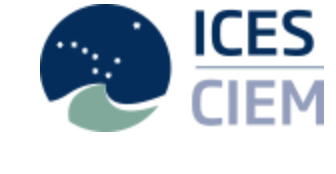
The International Council for the Exploration of the Sea (ICES) is a global science organization for enhanced ocean sustainability. ICES Science and Advice considers both how human activities affect marine ecosystems and how ecosystems affect human activities. In this way, ICES ensures that best available science is accessible for decision-makers to make informed choices on the sustainable use of the marine environment and ecosystems. ICES is a network of more than 4000 scientists from almost 300 institutes, with 1600 scientists participating in activities annually.
Contribution to PANDORA: ICES will contribute to WPs 1 (Existing and new biological knowledge), 2 (Resource assessment and projection), 4 (Management options) and 5 (Engagement, communication & impact); lead task 1.1 on scoping regional management needs and co-lead task 5.1 on co-creating PANDORA with EU fisheries stakeholders. ICES will be involved in training, integration of new knowledge into operational advice and incorporation of new data collection methods into stock assessments. ICES will also work on enabling conversations and co-creation of methods between research scientists and ICES advisory working groups.
Contact: Lotte Worsøe Clausen, Head of Advisory Support
10. European Commission Joint Research Centre (JRC) 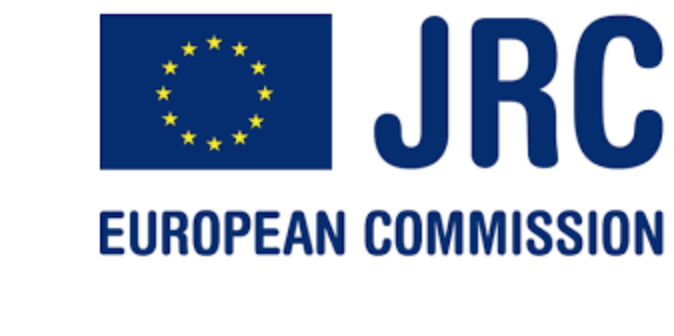
As the European Commission's science and knowledge service, the Joint Research Centre's mission is to support EU policies with independent evidence throughout the whole policy cycle. Its work has a direct impact on the lives of citizens by contributing with its research outcomes to a healthy and safe environment, secure energy supplies, sustainable mobility and consumer health and safety. Located across five different EU countries, the JRC hosts specialist laboratories and research facilities with ca. 2000 scientists working to support EU policy. Most of JRC scientific work serves the policy Directorates-General of the European Commission, by addressing key societal and policy challenges while stimulating innovation and developing new methods, tools and standards. Know-how is shared with Member States, the scientific community and international partners. The JRC collaborates with over a thousand organisations worldwide whose scientists have access to many JRC facilities through various collaboration agreements but also in EU-FP projects. The JRC has a long-standing record of supporting the Common Fisheries Policy with scientific advice as requested in its basic regulation (EU)1380/2013. The advice is based on in-house fisheries modelling approaches, stock assessments and Management Strategy Evaluation. To this end the JRC also compiles, processes and analyses fisheries and aquaculture data, collected under the Data Collection Framework (EC) 199/2008.
Contribution to PANDORA: The JRC will be contributing to WPs (Resource assessment and projection) and 4 (Management options) through the application of in-house modelling approaches and contributing with the experience in designing multi-annual management plans for EU fish stocks.
Contact: Dr. Jann Martinsohn, Head of the JRC Fisheries and Aquaculture Sector
13. Pelagic Freezer-Trawler Association (PFA) 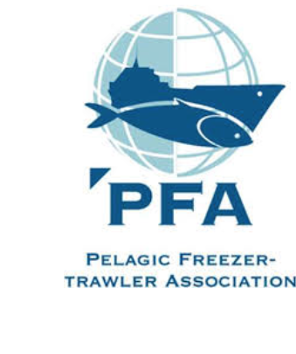
The Pelagic Freezer-trawler Association (PFA) is a European association that represents the interests of pelagic trawler owners fishing pelagic fish for human consumption. Nine trawler companies from five EU countries are members of the PFA, each with a long history in the fishing industry. The PFA has anchored sustainability in the overall policy of the Association and the activities of its members. As a result, the PFA has developed an integral perspective and policy in which responsible entrepreneurship takes a central position. As part of this overall ambition, the association has developed and is executing a comprehensive research strategy aimed at delivering knowledge and information from fisheries to science and management. Since 2015, self-sampling and utilization of historical information collected within the fishing industry has been an important element of the overall research activities.
Contribution to PANDORA: PFA will contribute to WPs 1 (Existing and new biological knowledge), 2 (Resource assessment and projection) and 5 (Engagement, communication & impact). PFA will contribute to the further development of the self-sampling programme to deliver additional biological and environmental data to be used in the project. The PFA will contribute to the further development of the self-sampling programs both within our association and in other industry groups to deliver additional biological and environmental data to be used in the project. In addition we will work on in conjuction with the University of Amsterdam and Wageningen Marine Research on the utilization of industry data for the modelling of fish growth and bio-energics.
Contact: Martin Pastoors, Chief Scientific Officer
14. Scottish Pelagic Fishermen’s Association (SPFA)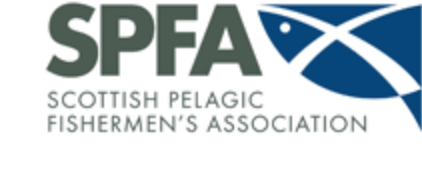
The Scottish Pelagic Fishermen’s Association Ltd (SPFA) has been promoting and protecting the interests of the Scottish pelagic fishing fleet for the last 85 years at national and international level. The Scottish pelagic fleet remains at the forefront of European pelagic fishing and the primary activity of SPFA is to represent its 22 member vessels at both the political and fisheries management levels, and to ensure a sustainable future for pelagic fisheries. The membership is based at three branches located at Fraserburgh, Peterhead and Shetland. The sector’s main fisheries are North-East Atlantic mackerel, North Sea, West of Scotland and Atlanto-Scandian herring and Northern blue whiting. SPFA takes its sustainability responsibilities seriously and is a member of the Scottish Pelagic Sustainability Group which has driven forward a number of sustainability and responsible fishing initiatives since it was established in 2007. These include MSC Certification of North Sea herring, Western mackerel, Atlanto-Scandian herring and blue whiting. Through its connections with organisations such as the Scottish Fishermen’s Federation (SFF), North East Fishermen’s Training Association (NEFTA), Shetland Fisheries Training Association (SFTA) and Seafood Scotland, the Association ensures there remains strong emphasis on safety at sea, fishermen’s training and catch quality.
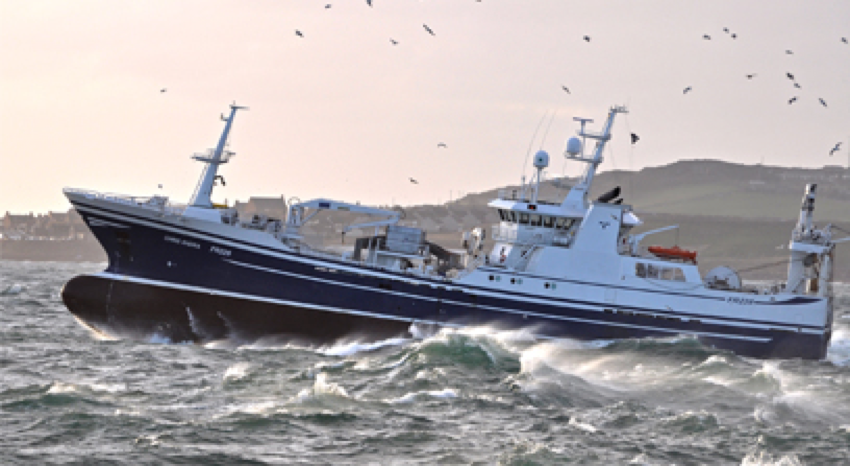
Contribution to PANDORA: SPFA will primarily work with UHI (University of the Highlands and Islands) and MSS (Marine Scotland Science) to develop and pilot an industry self-sampling programme for pelagic trawl and seine mackerel fisheries. The main work will be undertaken in WP1 (Existing and new biological knowledge) and 5 (Engagement, communication & impact), with contributions in WP2 (Resource assessment and projection) to ensure continuity from data collection to its application for developing scientific advice.
Contact: Steve Mackinson, Chief Scientific Officer
24. Cooperatie Kottervisserij Nederland UA (VisNed)
VisNed is an umbrella organisation representing the fisheries Producers Organisations of Urk, Southwest and North of The Netherlands. The organisation is the largest interest group for the Dutch demersal fisheries comprising of about 70% of the fisheries for flatfish and 40% of the fisheries for brown shrimp. VisNed’ s mission is to advocate the interest of the fisheries in questions around fisheries management, quota management and sustainability issues. VisNed has extensive experience in stakeholder processes leading to the implementation of fisheries management on both national and international level. In addition, VisNed has experience in developing and managing research projects concerning data-collection, technological innovations and selectivity-related issues in demersal mixed fisheries.
Contribution to PANDORA: VisNed will contribute to all WPs, participating in meetings centered around stakeholder input, joining workshops scoping regional management needs for biological information and supporting and generating fishery-derived data.
Contact: Wouter van Broekhoven, Science and Policy Advisor
